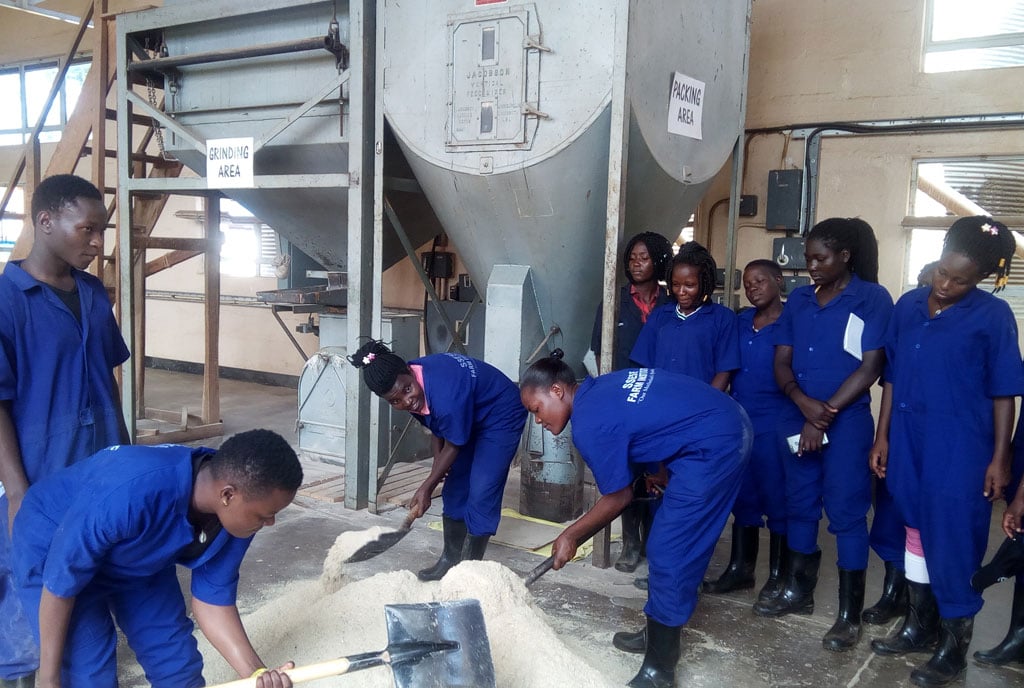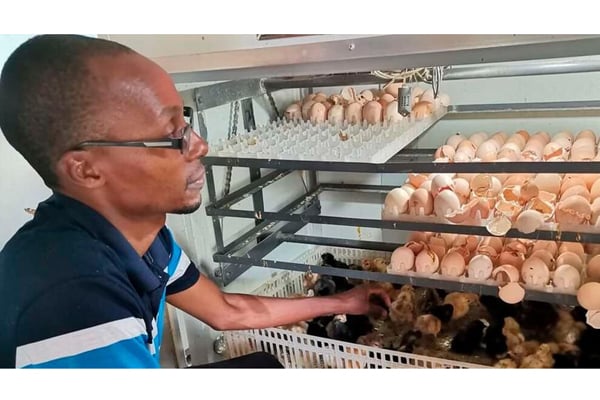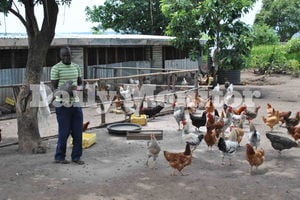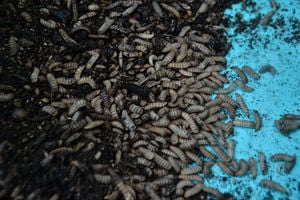
Student of MUARIK Kabanyoro preparing chicken feed mixture at the institute mill. PHOTO/LOMINDA AFEDRARU
The commercial diet for chickens is comprised of different grains often concentrated in higher protein content for rapid growth.
Experts contend an average chicken diet is composed of 42.8 percent corn and 26.4 percent soybean for protein and 14 percent bakery meal. In most cases farmers rearing local chicken of free range will leave them to roam and feed on whatever feed they come across including grass or plant leaves.
However, scientists have discovered that feeding charcoal as supplement feed to chicken has enormous benefits.
Background
Poultry scientists explain that it is not the first thing that springs to mind when we hear the words ‘charcoal’ and ‘chicken’ together, but charcoal as a chicken feed supplement can provide real health benefits.
Because animals’ water and feed can be exposed to contaminants from rodents, flies or birds, for example many poultry farmers are following an age-old practice of adding charcoal to drinking water or feed. In Europe, commercial activated charcoals have been specifically designed as an additive for cattle and poultry feed.
The charcoal is able to absorb toxins from the food or water, improving hygiene and health. Better hygiene can also help prevent infections such as Salmonella in meat and eggs. Wild animals will often visit sites where there have recently been fires and have been observed eating charcoal.
Charcoal keeps the digestive system healthy
Research suggests that they consume it for its medicinal and toxin binding properties.
While it has no nutritional value itself, charcoal contributes to keeping an animal’s digestive system healthy.
It helps to relax and can help move the impurities it absorbs out of the body. If worms or worm eggs are present, it can to some degree help move them out of the body as well.
Poultry feed containing 1-1.5 percent charcoal has resulted in increased laying rate, a longer laying period and increased egg weight. Charcoal in the diet will also reduce the odour of chicken manure. Scientists advice poultry farmers to produce their own charcoal for chicken feed mixture. Charcoal produced from slow-burned untreated timber can be added to farmers flock’s food or just left where the chicken can scratch and peck at it as they please.
Wood ash makes a good addition to their favourite dust-bathing spots as it has a very nice texture.
Slow burning is essential to charcoal making, you can damp down a fire that is burning too quickly with some water.
Once it’s all cooled down, crush it up a bit and throw a handful in with the poultry feed or where the chickens will scratch.
Feeding charcoal improves chicken litter as fertiliser
In a US based farm progress publications the scientists explain how charcoal is useful as chicken feed mixture.
When charcoal is used in the feed, the bacteria in the manure convert the uric acid into ammonium.
This makes the litter less odorous or harmful, and can make it a better nitrogen fertiliser for crops, too.
According to a university of Georgia poultry specialist, if chicken eat a bit of charcoal it helps lower the amount of ammonia in their manure which lead to healthier and more environmental friendly chicken species.
Scientists from Casey Ritz cooperative extension poultry have been researching charcoal as an additive to poultry to control ammonia level in chicken house. High level of ammonia in litter can affect a chickens growth and performance. However in the research, the scientists gave one group of chicken feed where charcoal is added and another group normal feed.
The team incubated the chicken manure and they found significant drop in the amount of ammonia in the manure
Charcoal acts as natural filter
Charcoal is porous making it a good natural filter. It has no nutritional value for chicken and it only acts as filler in their feed.
It is important to consider the amount added to the feed in order not to make it excess.
The droppings will become better fertiliser.
Chicken produce ammonia through their manure. The Nitrogen in the feed they eat is converted into uric acid in their intestine. When charcoal is used in the feed the bacteria in the manure converts the uric acid into ammonium .This makes the litter less odorous and can make it a better nitrogen fertiliser for crops.
How the charcoal helps the chicken body
In the dust bath charcoal or wood ash added to your chickens’ dust bath it helps to suffocate parasites such as mites, lice, fleas and ticks. As a feed supplement it has been observed that animals in the wild will distress on charred branches and stumps after a forest fire.
Charcoal works as a laxative and detoxifier, flushing toxins out of the body. It will also help expel internal worms to some extent.
Calcium is the most abundant element in wood ash, but it is also a good source of potassium, phosphorus and magnesium which is useful in the chicken body.
Adding wood ash to your chicken feed in aone percent ratio can improve lay rates, extend laying periods and will also reduce the smell of the chicken droppings.
Key fact
The charcoal is able to absorb toxins from the food or water, improving hygiene and health. Better hygiene can also help prevent infections such as Salmonella in meat and eggs.




